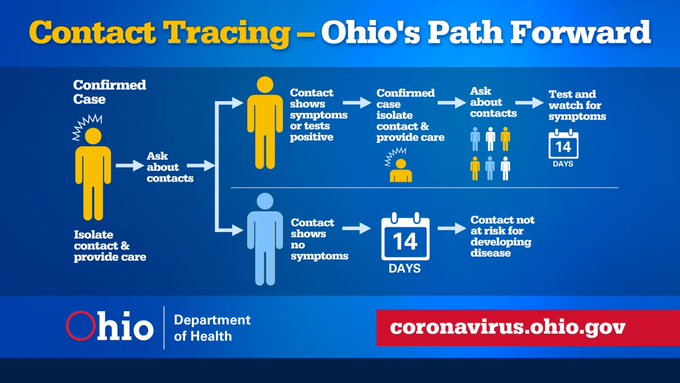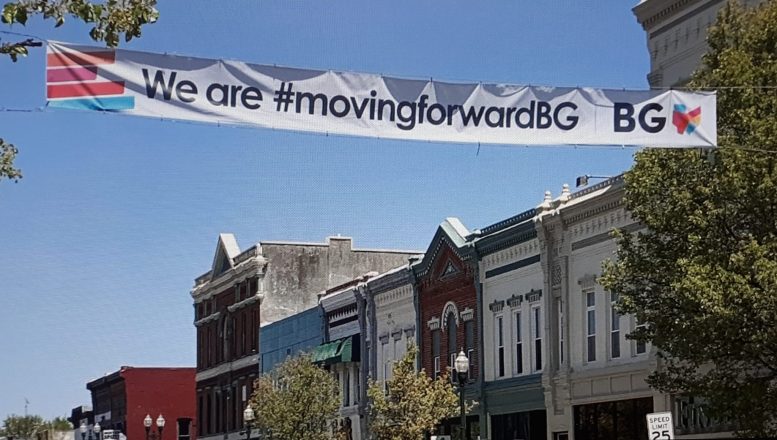The reopening of Ohio means more people are out in public, and the state’s department of health wants to keep those infected by COVID-19 away from others.
To do that, the Ohio Department of Health is carrying out a “contact tracing” program. The goal is to identify those with the virus as well as those who have been in recent contact with them.
“Limiting contacts means the virus isn’t able to infect other people,” the state’s coronavirus website reads. “The virus lives in people. Limiting contacts means the virus has nowhere to live.”
Gov. Mike DeWine has called contact tracing an “important part” of his administration’s Responsible RestartOhio plan.Governor Mike DeWine✔@GovMikeDeWine
Contact tracing is an important part of the #ResponsibleRestartOhio plan.
Learn more: http://bit.ly/2YL5ZP7 #InThisTogetherOhio #StaySafeOhio

297Twitter Ads info and privacy459 people are talking about this
Here are some key takeaways and details about the contact tracing program:
How it works
The process begins with a person testing positive for COVID-19.
From there, contact tracers correspond with that person to learn who else they might have been in contact with. Such basic questions would include where that person has gone, who they have hung around with lately, etc.
The tracers would then attempt to reach out to those other people to inform them of their potential contact with a COVID-19 patient. These people are asked to self-quarantine for 14 days, so as to not spread the virus any further.
That time period is important, according to the Ohio Department of Health, because the virus has an incubation period for up to two weeks. This means a person could have it but not show symptoms at first. If the person does not show symptoms (cough, fever and shortness of breath) after two weeks, the quarantine is lifted.
This entire program is voluntary.
Ohioans are strongly encouraged to participate in the contact tracing program, but they are not required to do so. This goes for COVID-19 patients themselves and for those they have been in contact with, said Melanie Amato, the press secretary for the Ohio Department of Health.
“We can’t force people to provide information on where they have been and who they have talked to,” Amato said, “but it would greatly benefit us in helping stop the spread.”
The 14 days of self-quarantine is similarly optional but “highly advised,” Amato said.
The state is getting help from a Massachusetts nonprofit, but the contact tracers will be local.
This program is receiving help from a Massachusetts nonprofit named Partners in Health (PIH) to carry out contact tracing in Ohio.
PIH has led mitigation efforts in other countries for viruses such as Ebola and Zika. Now the organization is providing resources to states like Ohio in conducting contact tracing here.
According to Amato, the nonprofit is providing “advice, guidance, templates, communication ideas and lessons learned.”
The actual contact tracing work will come from Ohio workers and volunteers. The state health department has already hired 100 employees around Ohio. The state is also giving funds to local health departments to hire their own contact tracers, Amato said.
You can read more about the contact tracing program on the Ohio coronavirus website here.
***
Ohio prisons chief: Inmates getting ‘excellent’ health care; 63 dead, thousands infected
Ohio has decreased its prison population by less than 4% while some institutions have been virtually overrun by COVID-19.
Four prison workers and 63 inmates have died since prison officials first detected the new coronavirus March 29. More than 4,500 inmates have tested positive, though officials believe this to be a massive undercount since they abandoned a mass-testing strategy.
But Ohio Department of Rehabilitation and Corrections Director Annette Chambers-Smith believes she and her team have met the moment.
“I think these people are getting excellent health care, both inside our prisons and inside our hospitals,” she said. READ MORE
Tax amnesty program passes Ohio House
A bill to give temporary tax amnesty to delinquent payers was approved unanimously by the Ohio House Wednesday
The amnesty program seeks to boost state revenues during the pandemic with tax payments that may not ordinarily be paid without an incentive.
State Rep. Thomas West, D-Canton, sponsor of House Bill 609, said it is a “simple but impactful” part of the economic response to COVID-19-related losses. READ MORE





